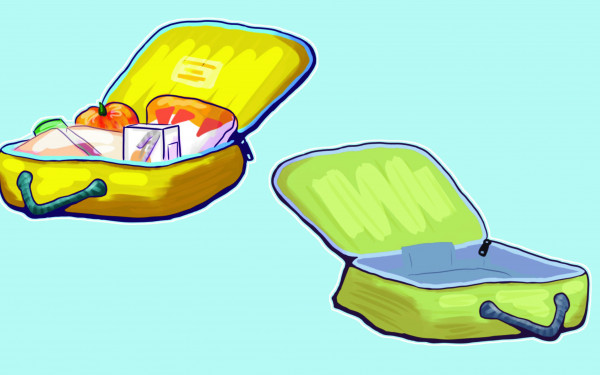More Than Just a Backpack For Books
One McGill Student’s Innovative Design to Provide Light to Students Worldwide
There are currently 1.3 billion people living without electricity in the world, according to the International Energy Agency.
This month, the first 50 prototypes of the Soular Backpack were distributed to schoolchildren in Kenya.
The solar panel attached to the the backpack channels energy from the sun and allows students living without electricity to study in their homes at night. The prototypes mark the beginning of one individual’s mission to rectify this global energy issue.
Growing up in Kenya
Salima Visram, a graduate from McGill University, was born and raised in Kikambala, a small village in Kenya on the outskirts of Mombasa. Although Mombasa is the second-largest city in Kenya, a large portion of the population still lives below the poverty line, without electricity or running water.
“I grew up never having to worry about my basic needs, but my parents always made sure that I knew that I was lucky to be educated,” Visram told The Link in a Skype interview. “From the age of four, I was always out in the village with my mom, working on different projects to help others.”
Growing up in a town stricken by poverty shaped Visram into the entrepreneur that she is today. At the age of 12, she had already started her own business making jewelry.
At first, she was crafting jewelry for her family and friends but they soon grew tired of it, and she thought, “How can I make this business viable?”
She employed local women to help make the jewelry and sold her products at a boutique in town. All the funds went to a girls’ choir in her village that didn’t have enough money to compete in a prestigious music festival in Kenya. In a year, Visram raised enough money for them to buy uniforms and attend the out-of-town competition. That year, they placed second and the next year, they won the competition.
At a young age, Visram was already making a difference in her community.
An idea is formed
Today, at 23 years old and with a degree in International Development Studies and Management, Visram hasn’t forgotten her roots.
During her studies at McGill, Visram felt that there was a disconnect between the theory she was learning in class and what was actually happening in the world.
Combining her studies in business and international development, she took the initiative to start an independent research project in the last year of her Bachelor’s degree.
Visram developed an idea to make a solar-powered product to provide light to families without electricity.
“My first concern was always knowing what the customer needed. I didn’t just want to make a product that I thought was good, it needed to reflect the needs of the people that were going to use it,” said Visram.
In her hometown, students walk for hours to get to school and back. At the end of the day when it is dark out, those who are not fortunate enough to have electricity in their homes study under kerosene lamps, a product harmful to their health.
Wearing the Soular Backpack to and from school, students will generate enough electricity to study at home with no additional effort made.
Creating the Soular Backpack
Visram met one of her mentors through the McGill Women in Leadership group on LinkedIn. During her independent research project, she worked with Morna Flood Consedine, a Concordia alumna, program leader at the McGill Executive Institute and President of Maracon Associates International Inc.
The Soular Backpack attracted her attention because Visram operated at a grassroots level by working closely with the parents and children in the village school, Consedine said. She wanted to help Visram in any way she could: one of her big contributions was helping Visram raise money for the project.
“She tackled a really critical problem, both on an educational and health related issue,” Consedine told The Link.
Once the Soular Backpack was conceptualized, Visram started a crowdfunding campaign to raise money to manufacture them. Each backpack costs $20 to make and ship to Kenya. They are all made in China but Visram was quick to point out that all the certifications are in place and that they are not made from child labour.
Her goal was to reach $40,000 in two months. She said that on the last night of the campaign, she received $20,000 allowing her to surpass her original goal, and raise a grand total of $50,000.
Today, she still hasn’t spent all of the money she raised. She is careful about where she invests it, wanting to make sure that the money donated actually goes into the making of the backpacks, as people expect.
There are currently 50 Soular Backpacks that exist in the world. Visram was passionate about giving these first backpacks to students from the school down the road from where she grew up. The backpacks were evenly distributed between girls and boys in Grade 6 and 7.
In Kenya, students pass exams at the end of Grade 7 to advance to secondary school. Since a majority of students cannot study at home after school without electricity, few advance in their studies. Visram hopes that these backpacks will make a difference in her village and allow more children to attend secondary school, she said.
Finding a business model
For the next three months, Visram will be in Vancouver for The Next Big Thing field fellowship. The fellowship works closely with 10 young entrepreneurs to develop and make their business model successful and profitable.
“I see myself working on this project for a long time. I want it to grow into something that is financially sustainable,” said Visram.

_900_584_90.jpg)
_900_507_90.jpg)
_900_603_90.jpg)
_600_832_s.png)

_600_375_90_s_c1.jpg)

1_600_375_90_s_c1.jpg)
